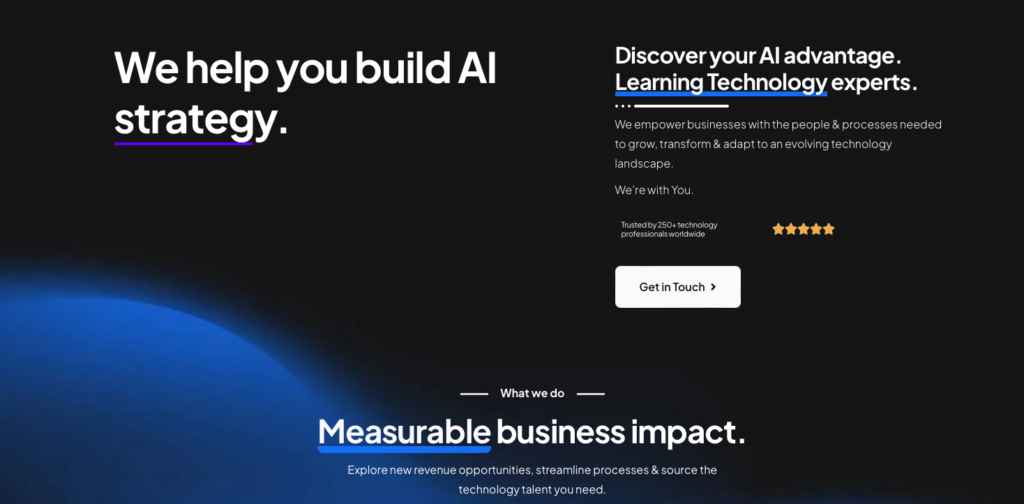EdTech Consulting: How to Find the Best Consultant.
A Guide to EdTech Consultants & How They Add Value to Your Business.
Introduction

In the rapidly evolving field of educational technology (EdTech), finding the right consultant can significantly impact your organization’s ability to leverage AI and automation for strategic advantage. This article will guide you through the process of finding the best EdTech consultant, understanding what an EdTech AI consultant does, how they can help shape your strategy, and what is involved in EdTech strategy development.
How to Find the Best EdTech Consultant

Identifying Your Needs
Before you begin your search for an EdTech consultant, it’s crucial to identify your specific needs. Are you looking for assistance with AI integration, automation of administrative tasks, or developing a comprehensive EdTech strategy? Defining your goals will help you find a consultant with the right expertise.
Key Considerations:
- Scope of Work: Clearly outline the areas where you need consulting services, whether it’s specific projects like AI integration or broader initiatives like overall strategy development.
- Budget: Determine your budget to ensure you can afford the services of a top-tier consultant. Remember that investing in a high-quality consultant can save costs in the long run by avoiding implementation pitfalls.
- Timeline: Establish a timeline for the project to ensure the consultant can meet your deadlines. Factor in time for initial assessments, strategy development, implementation, and post-implementation reviews.
Some, not all EdTech Consultants, will work on a retainer basis, offering expertise as effectively an employee / senior manager in your organisation. Others will provide project-specific support, much like any other consultant, working with senior leaders in the organisation to shape organisational strategy.
Evaluating Potential Consultants

When evaluating potential consultants, it doesn’t always come down to costs, you will need to consider the following factors:
- Experience and Expertise: Look for consultants with a proven track record in EdTech and AI. Check their previous projects and client testimonials. Experience in the educational sector specifically can be crucial as it requires understanding unique challenges and regulatory requirements.
- Industry Knowledge: Ensure the consultant has deep knowledge of the education sector and understands the unique challenges and opportunities it presents. They should be aware of the latest trends in EdTech and emerging technologies.
- Technical Skills: Assess their technical skills in AI, machine learning, and automation. They should be proficient in the latest AI tools and technologies relevant to education.
- Communication and Collaboration: Effective communication and collaboration are essential for a successful consulting engagement. Ensure the consultant can work well with your team and is responsive to feedback and queries.
Depending on the level of involvement you need – AI strategy vs Ai implementation, this search may take quite a long time. Alternatively, you can find an AI EdTech Consultant like Understated which covers everything from defining an AI strategy through to automation implementation & recruitment of key staff.
How to Find an EdTech Consultant

You can of course, use the leading EdTech AI Consultancy; Understated, for your projects – we have 10 years working in education and 4+ years specialising in leveraging AI & Digital Technology for education. Alternative sources for EdTech Consultants include:
- Professional Networks: Leverage your professional network to find recommendations for reputable EdTech consultants. Peer recommendations can provide insights into the consultant’s working style and effectiveness.
- Industry Conferences: Attend EdTech conferences and events to meet potential consultants and see their work firsthand. These events also offer opportunities to learn about the latest innovations and best practices in the industry.
- Online Platforms: Use platforms like LinkedIn, Clutch, and consulting directories to find and evaluate consultants. These platforms often feature reviews and ratings from previous clients, providing a clearer picture of the consultant’s capabilities.
Our recommendation would be to find someone, or a team of people who have worked both in the education sector & the AI or technology space for a while, although I would recommend a heavy emphasis on AI, even if potential candidates have a strong technology background, it might not be applicable to Artificial Intelligence and it might not be suitable for your use case.
What Does an EdTech AI Consultant Do?

Key Responsibilities
An EdTech AI consultant provides specialized expertise in leveraging AI technologies to enhance educational processes and outcomes. Their key responsibilities include:
- Needs Assessment: Conducting a thorough assessment of your organization’s current technology infrastructure and identifying areas for improvement. This involves understanding your educational goals and the current state of your technology usage.
- Strategy Development: Developing a comprehensive AI strategy tailored to your organization’s goals and objectives. This includes identifying specific AI tools and technologies that can benefit your educational programs.
- Implementation Support: Assisting with the implementation of AI tools and technologies, ensuring seamless integration with existing systems. This involves project management, troubleshooting, and ensuring the new tools are used effectively.
- Training and Support: Providing training for staff and ongoing support to ensure successful adoption of AI technologies. This includes creating training materials, conducting workshops, and offering continued technical support.
Specialized Skills
- AI and Machine Learning: Proficiency in developing and deploying AI models tailored for educational applications. This might involve creating predictive models to personalize learning or AI-driven tools to assist teachers.
- Data Analytics: Ability to analyze educational data to derive insights and inform decision-making. This can include evaluating student performance data to identify trends and areas for improvement.
- Automation: Expertise in automating administrative and instructional tasks to improve efficiency. For example, automating grading systems or streamlining administrative processes through AI.
How EdTech AI Consultants Can Help Shape Strategy

Strategic Planning
EdTech AI consultants play a crucial role in strategic planning by helping organizations define their AI goals and create a roadmap for achieving them. This involves:
- Vision Setting: Establishing a clear vision for how AI will be used to enhance educational outcomes. This vision should align with the broader goals of the educational institution.
- Goal Alignment: Ensuring that AI initiatives align with the organization’s overall strategic goals. This means integrating AI projects with existing educational frameworks and objectives.
- Resource Allocation: Identifying the resources required for successful AI implementation and optimizing their allocation. This includes budgeting for software, hardware, and training.
Technology Integration
Consultants assist with the seamless integration of AI technologies into your existing infrastructure, which includes:
- System Compatibility: Ensuring new AI tools are compatible with current systems to avoid technical issues and ensure smooth operation.
- Data Integration: Integrating data from various sources to create a unified data ecosystem. This helps in making data-driven decisions and enhances the functionality of AI tools.
- Scalability: Designing scalable solutions that can grow with your organization. This ensures that the AI tools can handle increasing amounts of data and more users as the organization expands.
Training and Change Management
Successful AI adoption requires training and change management. Consultants help by:
- Developing Training Programs: Creating training programs to upskill staff and ensure they are comfortable using new AI tools. This includes hands-on workshops and online tutorials.
- Change Management: Implementing change management strategies to foster a culture of innovation and acceptance of new technologies. This involves communicating the benefits of AI, addressing concerns, and providing continuous support.
What is Involved in EdTech Strategy Development?

Comprehensive Needs Analysis
Developing an EdTech strategy starts with a comprehensive needs analysis, which includes:
- Stakeholder Interviews: Conducting interviews with key stakeholders to understand their needs and expectations. This helps in aligning the strategy with the goals of teachers, administrators, students, and parents.
- Technology Audit: Assessing the current technology landscape to identify gaps and opportunities. This includes evaluating existing tools and determining their effectiveness.
- Data Analysis: Analyzing educational data to identify trends and areas for improvement. This helps in understanding the current performance and where AI can make the most significant impact.
Strategy Formulation
Based on the needs analysis, consultants develop a tailored strategy that includes:
- Vision and Goals: Defining the vision and specific goals for AI integration. This provides a clear direction and purpose for AI initiatives.
- Roadmap Development: Creating a detailed roadmap outlining the steps required to achieve the goals. This includes timelines, milestones, and responsible parties.
- Resource Planning: Identifying the necessary resources, including budget, personnel, and technology. This ensures that all elements required for successful implementation are in place.
Implementation and Monitoring
The final stage involves implementing the strategy and monitoring its progress, which includes:
- Pilot Programs: Launching pilot programs to test AI tools and approaches. This helps in identifying any issues early and making necessary adjustments.
- Performance Metrics: Establishing metrics to measure the success of AI initiatives. This includes both quantitative and qualitative measures.
- Continuous Improvement: Regularly reviewing and refining the strategy based on feedback and performance data. This ensures that the strategy remains relevant and effective as technology and educational needs evolve.
Conclusion

Hiring an EdTech AI consultant can significantly enhance your organization’s ability to leverage AI and automation for educational success. By carefully identifying your needs, evaluating potential consultants, and understanding their role in strategy development, you can find the right partner to help you achieve your goals. Consultants like those at Understated Consulting bring specialized expertise in AI automation, AI strategy consulting, and AI for EdTech businesses, ensuring you stay ahead in the rapidly evolving educational landscape. Investing in a skilled consultant will help you create and implement effective EdTech strategies, leading to improved educational outcomes and operational efficiencies.

